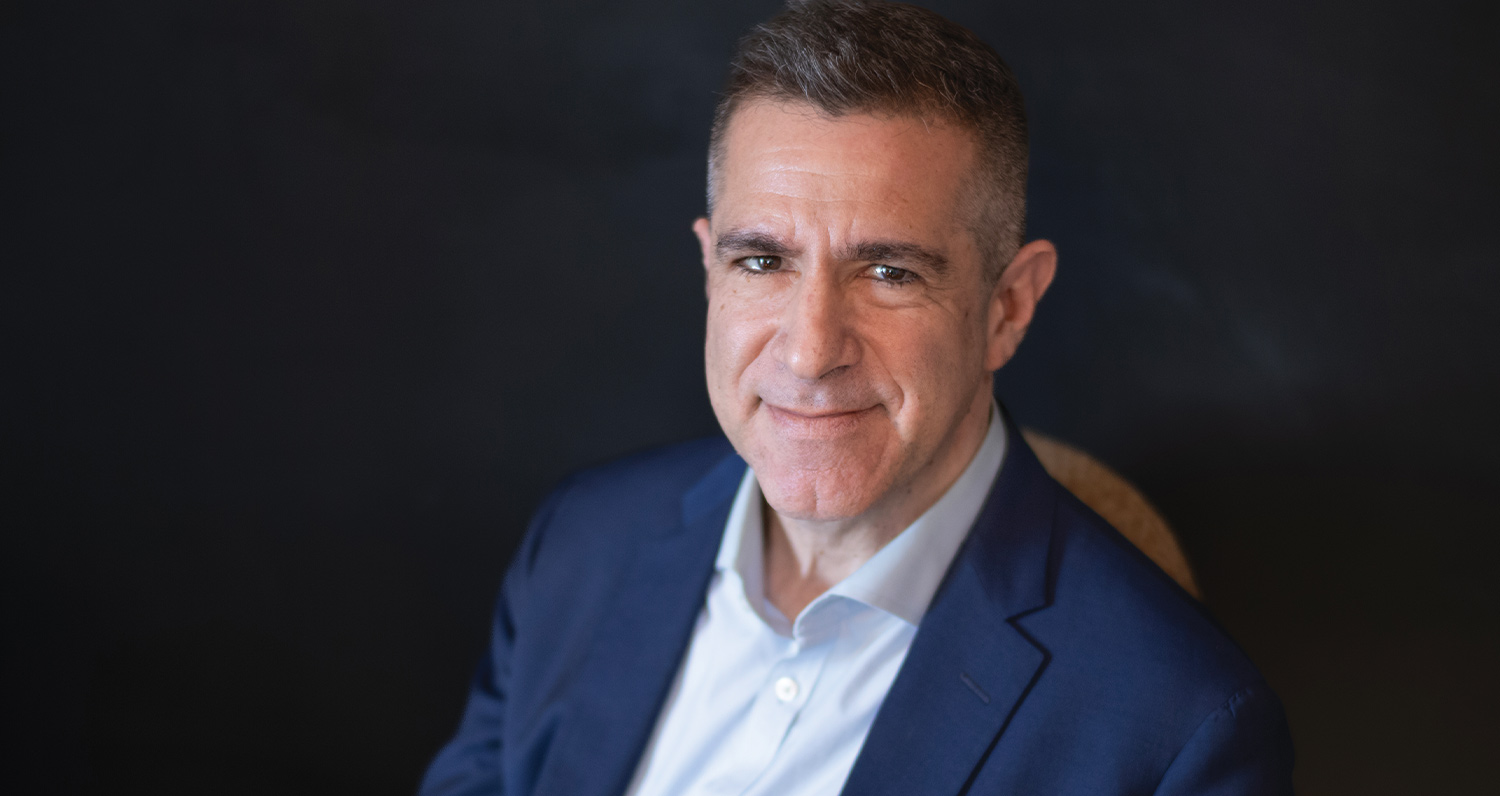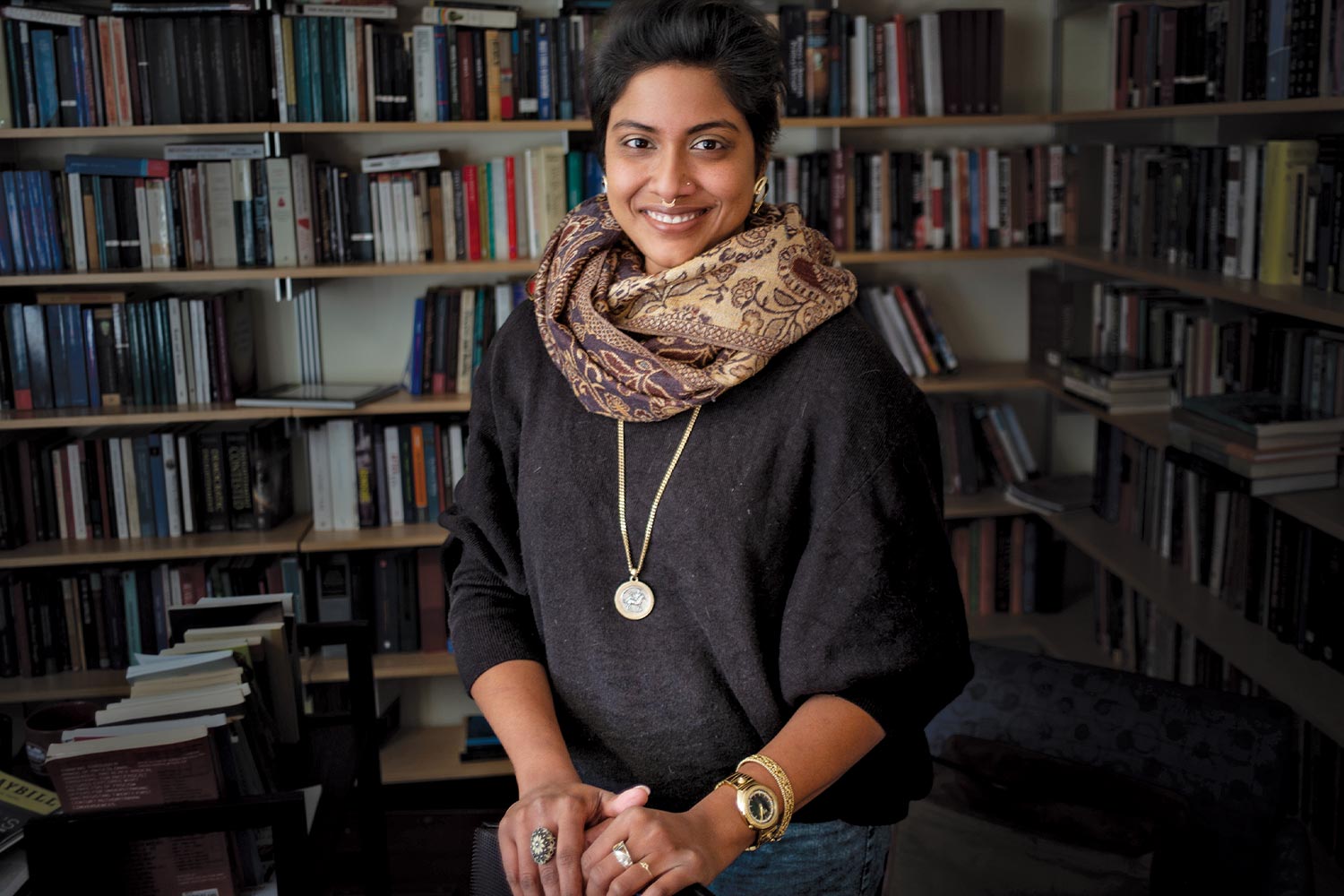Can Peace Building Be Taught?
LAURENCE KESTERSON
“has changed everything about how I teach, try to co-create communities of learners in the classroom, and support students through their own development,” says Johnson.
The Pathfinder
“I was very young, maybe 4 or 5,” says Johnson, who also teaches in the Black Studies and Peace & Conflict Studies departments. “But I remember very vividly [a man] who had been incarcerated. He was somebody my father mentored and loved deeply. When he came home from Attica, he stayed with us. We just adored him. So it was never something that I was afraid of. My parents taught that we cannot be reduced to our worst moment. We are all so much more. More importantly, it isn’t about the choices we make, it’s about the choices we have. The outcomes we are seeing are the result of the social, political, and economic conditions that have been created by those in power.”
Later, while Johnson was in graduate school for sociology at Northwestern University, she had multiple loved ones who were incarcerated. She often felt isolated in the graduate school program, where peers and professors described Black neighborhoods as “pathological.” But her research, on Black people who have to leave their neighborhoods for educational opportunities, helped her realize her experiences were not hers alone. All of the research participants had attended Ivy League schools, and “everyone I interviewed had a cousin, sibling, or friend who was incarcerated,” says Johnson.
After receiving an invitation to guest lecture at the Pa. State Correctional Institution-Chester in the spring of 2013, she quickly realized she wanted to teach her own class in the prison. She attended a pedagogical training with incarcerated educators in January 2015 and has been teaching in prisons since the fall of 2015.
“I remember an incarcerated student being deeply moved by feedback on his assignment and saying, ‘No one ever complimented my intelligence before,’” says Johnson. “This is an incredibly brilliant person in a set of systems and structures that refuse to recognize his humanity.” The experience of teaching in prisons has allowed her to live a life in alignment with her ethics and values, something she encourages in her Swarthmore students. “Bringing resources from this institution to where people have all the ideas, and all of the gifts, but don’t have the infrastructural support to carry those things out, has been essential,” says Johnson. She teaches classes on politics, culture, race, class, mobility, inequality, cities, and public policy. Johnson is also part of two think tanks, the Greater Freedom Think Tank and the Chester Think Tank, both of which contain a mix of formerly, currently, and non-incarcerated scholars. The think tanks bring people together across profound social difference and distance to engage in ongoing dialogue within and outside of carceral spaces. One project researches the impact of incarceration on the most disinvested ZIP codes in Philadelphia. “What we really see is that the safest communities don’t have more police, they have more resources,” says Johnson. “I really appreciate Sociology and Anthropology, Black Studies, and the Lang Center for how they’ve supported the think tanks.”
Three Decades of Peacemaking
Its multidisciplinary curriculum explores the causes, practices, and consequences of violence as well as peaceful or nonviolent methods of conflict management, resolution, and transformation. Students explore the many factors shaping human conflict, including the psychological, social, cultural, political, economic, biological, religious, and historical.
But above all, says Professor of Peace & Conflict Studies Lee Smithey, the story of the program centers on people.
“The program has been built on the goodwill and vision and volunteerism and hard work of students, staff, and faculty, and I’m ever so grateful,” Smithey, a former chair of the program, said at a 30th-anniversary celebration in 2022.
Recognizing the growth of the program since he arrived on campus in 2003, Smithey points to a range of supportive partners, including Pendle Hill (the Quaker retreat center in nearby Wallingford), the Friends Historical Library, the Swarthmore College Peace Collection, the Lang Center for Civic & Social Responsibility, the Intercultural Center, the Black Cultural Center, and the Interfaith Center.
Alumni who majored or minored in Peace & Conflict studies include Allison Oman Lawi ’91, the deputy director for the Nutrition Division at the United Nations World Food Programme, which received the Nobel Peace Prize in 2020 (see p. 24); Maurice Weeks ’09, co-executive director of the Action Center on Race and Economy, where he works with community organizations and labor unions on campaigns to help create equitable communities; and Jasmine Rashid ’18, director of impact for the Candide Group, where she helps direct loans and equity investments to minority women and Black/Indigenous/people of color-led social impact companies and funds.
“I remain eternally grateful to Swarthmore as a place where something like Peace & Conflict Studies can happen,” Oman Lawi said at the anniversary celebration. “Here, we can develop this idea of what it means to really be a global citizen and have all the rights but, more importantly, the obligations that go with that.” —RYAN DOUGHERTY

LAURENCE KESTERSON
The Bridge Builder
“They’re all filled with inspiring people,” says Berger. “[From] a student who just thought of this idea and wants some funds to go and get it done, or a community partner who has taken an abandoned warehouse and made the most beautiful art studio and maker space that you’ve ever seen, to faculty members who are applying knowledge to needs.”
The first job is managing the Center, with its 10 full-time staff members and 12 student employees. Job two is matching faculty, community partners, students, and alumni to build engaged scholarship opportunities based on shared interest and subject matter expertise.
“The real gold standard for engaged scholarship is centering community voices,” says Berger, “working alongside people who are affected by different problems, and co-creating knowledge with them.”
Job three is representing Swarthmore in the larger world. Toward that end, Berger serves on organizational boards both locally and nationally.
“We’re establishing Swarthmore as a leader among liberal arts colleges so that we can advance engaged scholarship nationally and even globally.”
The Lang Center helps the College engage local communities in a multitude of ways. One example is Peace, Friends, and Sanctuary, a project led by Lang Center Senior Associate Director Katie Price. She connects Swarthmore students with community groups in Philadelphia representing Syrian and Iraqi refugees to co-create projects, share meals, and learn about each other’s cultures.
“That’s been a multi-year collaboration,” says Berger. “It started out as a one-year thing, [but] Katie is co-teaching a class with [Associate Professor of Modern Languages & Literatures] Ben Smith in Arabic that is still having visits from some of those community partners.”
The Chester Overtown Artists Collaborative is another engaged scholarship program, co-facilitated by Berger and Assistant Director of the Lang Center for Civic & Social Responsibility Ashley Henry.
Overtown is a neighborhood in the city of Chester where the College rents an arts-and-theater space. “We are helping to support a Chester arts-and-technology group that is also renting that space and collaborating with our students,” says Berger. Additionally, students can now also use their meal plans at two Black-owned restaurants in the neighborhood.
“City Hall is a block away, the Chester Education Foundation is right there, too. It has a high density of our partners,” says Berger. “Our students can walk down the street and see a number of people they know —local artists, residents, shopkeepers,” says Berger, who teaches an Honors seminar in Modern Political Theory on top of running the Lang Center.
He also practices Inside-Out prison exchange pedagogy, teaching Swarthmore students alongside incarcerated students, having received training from Associate Professor of Sociology Nina Johnson. Political Science Professor Keith Reeves ’88 and Berger co-taught a class on the political philosophy of punishment at the State Correctional Institute in Chester. Berger also taught at East Jersey State Prison when he was a visiting professor at Princeton.
Collaborations with incarcerated students don’t necessarily end when they are released from prison. During the pandemic, some of the returning citizens who earned their college degrees in prison were able to join Swarthmore classes via Zoom.
“Somebody might be reading Discipline and Punish by Foucault and talking about it in a breakout room with somebody who had not only read the book, but had also been incarcerated,” says Berger. “It made for a much richer experience.”
He describes the process of bringing formerly incarcerated students and Swarthmore students together in terms of what scholar and legal activist Bryan Stevenson H ’19 calls “getting proximate” and Associate Professor of Peace & Conflict Studies Sa’ed Atshan ’06 calls “radical humanization.”
“It’s meeting people on their own terms who you might not have met otherwise, getting close to them, and seeing through their eyes,” says Berger. “Being open to having one’s perceptions on the readings, on the issues, changed because you’re seeing them through the eyes of those who are most affected by them.
“We’re just broadening the already transformative residential liberal arts experience to include a wider range of voices and perspectives.”

LAURENCE KESTERSON
The Questioner
From 2014 to 2015, Ahmed was living in Antalya, Turkey, and teaching English as part of the U.S. Fulbright Program. Syria’s civil war had begun a few years prior and was having a devastating impact on the region.
“Many of my peers and students were refugees: from Iraq, after the 2003 invasion; from Afghanistan; Syrians who were newly displaced,” says Ahmed, now assistant professor of philosophy with affiliations in Peace & Conflict Studies and Interpretation Theory. Their stories gave Ahmed, the daughter of migrants from what was the world’s largest refugee-hosting country until the Syrian civil war, the language to articulate her own out-of-placeness for the first time. “The discourse my friends, colleagues, and students were using was that of empire,” says Ahmed. They saw the events occurring in the Arab and Muslim worlds as “a consequence of U.S. imperial ambitions wrapped up in the language of liberalism and spreading democracy.”
As a South Asian Muslim living in a post-9/11 United States, this critique resonated with her.
At Swarthmore, Ahmed, a social and political philosopher, teaches courses on race, power, political resistance, Karl Marx, and Michel Foucault.
Foucault’s work, which she encountered in graduate school, “opened my philosophical world up to non-canonical theories and contemporary scholars who were writing in the service of critique and in the service of justice,” she says. “Since then, my research and work has been dedicated to making legible what it would mean to think about empire seriously as the organizing principle of modern politics.”
“Usually, philosophy tethers itself to universal truths, that is, propositions — like the idea that human beings are fundamentally autonomous and independent individuals, that there is a stark distinction between man and nature, that there is some primordial ‘state of nature’ out of which we have rationally decided to form political community — that are stable or unchanging across space and time,” says Ahmed. “The minute you bring historical context, social context, material context into the picture, for a lot of philosophers, you’re no longer doing philosophy, you’re no longer thinking rigorously: You’re doing history, you’re doing anthropology. And this has really prevented academic philosophers from reflecting on philosophy’s own complicity in global systems of domination and oppression.”
Believing philosophy to be inherently interdisciplinary, Ahmed doesn’t shy away from history or anthropology in her courses. She loves to do for her students what Foucault and Marx did for her: destabilize the ideas we otherwise take for granted. “Philosophy has a tendency to provide useful fictions to get certain theories off the ground, but often they don’t reflect any reality about how we are as human beings, as social and embodied beings,” says Ahmed. “But we can be different. Other ways of being and living together are possible.”